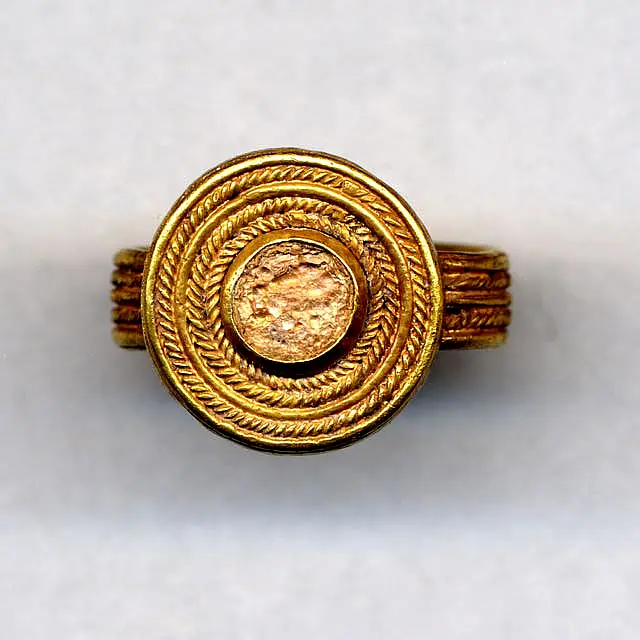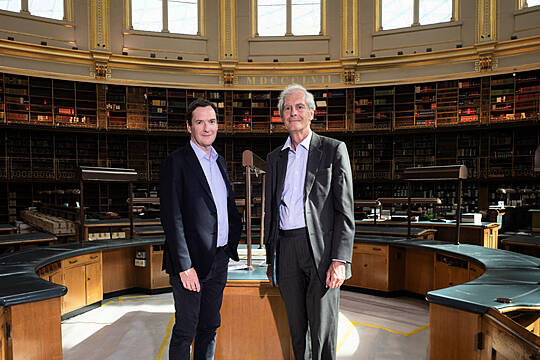Former UK chancellor George Osborne will be grilled by British MPs over artefacts stolen from the British Museum’s collection.
Mr Osborne, who is chairman of the British Museum trustees, and Sir Mark Jones, interim director of the body, will appear before the UK's Culture, Media and Sport Committee (CMS) on Wednesday.
The one-off evidence session will “focus on the reputational and financial implications for the museum and the wider national collection” in the wake of the thefts of thousands of items being disclosed.

MPs could also ask about what is being done to recover the items, if there has been damage to the museum’s reputation and how future relations with other institutions may have been impacted.
Later in the day, the CMS committee is scheduled to ask about the impact on the wider heritage sector.
Maria Balshaw, chairperson of the National Museums’ Directors Council (NMDC) and director of the Tate art museums and galleries, and Lord Parkinson, parliamentary under-secretary of state for arts and heritage, will also appear.

On August 16th, the British Museum revealed that the items – including gold jewellery, semi-precious stones and glass – were missing, stolen or damaged.
Later that same month, Mr Osborne told BBC Radio 4’s Today programme that an estimated 2,000 items were missing and some had been recovered.
He suggested that the British Museum did not have a complete catalogue of everything in its collection amassed over several hundred years and “groupthink” may have prevented the institution’s leadership from believing that treasures had been taken.
Mr Osborne said: “It’s certainly been damaging to the British Museum’s reputation. I think that’s sort of stating the obvious and that’s why I’m apologising on behalf of the museum.
“We believe we’ve been the victim of thefts over a long period of time and, frankly, more could have been done to prevent them.”
An unnamed member of staff has been sacked, and the British Museum said it is taking legal action.
The PA news agency understands the thefts were over a “significant” period of time before 2023.

The then director of the British Museum Hartwig Fischer – who had announced in July that he would step down next year – released a statement on August 23rd speaking of his “frustration”, while claiming the person who raised concerns about missing items at the institution did not disclose more.
Ittai Gradel, an author, academic and antiquities dealer, claimed the comments were an “outright lie” to PA and on August 25th, Mr Fischer resigned.
German art historian Mr Fischer said the museum “did not respond as comprehensively as it should have in response to warnings in 2021” about the thefts and he “misjudged the remarks” about Mr Gradel.
His deputy, Jonathan Williams also stepped back from his position.
Former Victoria And Albert (V&A) Museum director Sir Mark was confirmed in his new role in early September and vowed to “restore the reputation” of the British Museum.
On September 26th, the institution announced that “60 items have now been returned, with a further 300 identified and due to be returned imminently”.
The body also released images of classical Greek and Roman gems and jewellery – which are similar to the missing artefacts but not pictures of the absent items – to the public, which could lead to the recovery of more objects.
An international panel of experts, whose members include: James Ratcliffe from the Art Loss Register; Lynda Albertson from the Association for Research into Crimes Against Art; and other specialists in the field of ancient gems and jewellery, has also been formed to recover the objects.
Former British Museum trustee Sir Nigel Boardman, and Chief Constable of the British Transport Police, Lucy D’Orsi, are also leading an independent review into why the items went missing and what can be done in the future.
A Metropolitan Police investigation is under way into the thefts and a man was interviewed under caution on August 23rd.
No arrests have been made.







